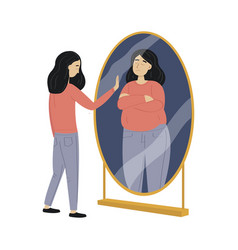Anorexia nervosa is a mental disorder that causes people to obsess about their weight and food. People who suffer from this disorder often have a distorted view of themselves, and see themselves as being overweight even when they are not. They will go to extreme lengths to lose weight, such as starving themselves or exercising excessively. Anorexia can be deadly, as it can lead to malnutrition, heart problems, and even death. In this blog post, we will discuss the symptoms of anorexia nervosa, and the treatment options available for those who suffer from it.
Contents
What Is Anorexia Nervosa?
 Anorexia nervosa is an eating disorder that is described as self-starvation and excessive weight loss. It is a serious mental illness with the highest mortality rate of any psychiatric disorder. Anorexia nervosa typically begins during adolescence, and women are much more likely to be affected than men.
Anorexia nervosa is an eating disorder that is described as self-starvation and excessive weight loss. It is a serious mental illness with the highest mortality rate of any psychiatric disorder. Anorexia nervosa typically begins during adolescence, and women are much more likely to be affected than men.
This condition is characterized by an intense fear of gaining weight, a distorted body image, and severe restriction of food intake. People with anorexia nervosa may see themselves as overweight even when they are dangerously thin. For example, a person with anorexia nervosa who weighs 80 pounds may believe they are fat and still try to lose more weight.
Anorexia nervosa is a serious mental illness with severe physical consequences. It can be deadly if not treated. The reason why it has such a high mortality rate is that people with anorexia nervosa often do not seek treatment until they are severely malnourished. By the time they receive treatment, their bodies have been through a lot of damage that may be irreversible.
In a nutshell, it is important to find out the early signs and symptoms of anorexia nervosa and get proper treatment as soon as possible. This can be a difficult task because people with this condition often deny that they have a problem. They may be afraid of gaining weight or ashamed of their eating habits.
What Are The Symptoms Of Anorexia Nervosa?
It is not always easy to tell if someone has anorexia nervosa. The illness may not be obvious at first, especially if the person is still eating and gaining weight. However, some early warning signs may signal that something is wrong, such as:
- Refuse to maintain body weight at or above the minimally normal weight for age and height (this is called “weight loss associated with malnutrition”).
- Intense fear of gaining weight or becoming fat, even though they are already very thin.
- Disturbances in the way they see their body weight or shape. For example, feeling overweight despite being underweight.
- Missed menstrual periods in girls and women of childbearing age.
- In men, there may be a decrease in testosterone levels.
- An unhealthy preoccupation with food, weight, and dieting.
- Extremely restricted eating. For example, only allowing themselves to eat very small amounts of food or skipping meals altogether.
- Unusual food rituals, such as excessive exercise, self-induced vomiting, using laxatives or diuretics, fasting, or excessive chewing and spitting out food.
- An extreme focus on their body weight and shape.
- Constant weight loss despite being underweight.
- Body mass index (BMI) below 18.0.
The symptoms and signs are different for each person. Some people with anorexia nervosa may have all of the above signs and symptoms, while others may only have a few.
For instance, if someone with anorexia nervosa only refuses to eat certain foods, they may not appear to be underweight. However, other signs and symptoms, such as preoccupation with food and weight, may be present. At this point, it becomes crucial for this person to get help from a mental health professional. Anorexia nervosa is a serious, life-threatening eating disorder. People with this eating disorder may appear to be thin, but the illness is much more than that.
What Are The Causes And Risk Factors?
 The exact cause of anorexia nervosa is unknown. It is thought to be a combination of psychological, physical, and environmental factors. Let’s take a closer look at each of these causes.
The exact cause of anorexia nervosa is unknown. It is thought to be a combination of psychological, physical, and environmental factors. Let’s take a closer look at each of these causes.
Psychological factors
People with anorexia nervosa may have a distorted view of themselves. They see themselves as overweight, even when they are underweight. They may be afraid of gaining weight and becoming fat. This fear can be so strong that it takes over their lives. Anorexia nervosa is more common in girls and women, but it can affect boys and men too.
Physical factors
Anorexia nervosa may be linked to changes in the brain. These changes may make a person feel full even when they have not eaten enough food. It is not clear what causes these changes in the brain. More often, anorexia nervosa is seen in people who have a family member with the disorder.
Environmental factors
Certain environmental factors may play a role in the development of anorexia nervosa. These include:
- A culture that values thinness and appearance over health and well-being
- Pressure to be thin from friends, family, or the media
- Having a job or participating in activities that require a thin appearance (such as modeling)
These environmental factors are not the cause of anorexia nervosa. But they may contribute to its development, especially in people who are already at risk for the disorder. So these are some most important causes and risk factors of this eating disorder.
Risk factors
Certain risk factors may increase the likelihood of developing anorexia nervosa. These include:
- Having a close family member with an eating disorder or mental illness
- Having a history of dieting or being overweight
- Being a perfectionist
- Gender differences
- Experiencing emotional or physical trauma
- Having a history of anxiety or depression
The risk factors are usually a combination of psychological, biological, and social factors. There is no single cause of anorexia nervosa. It is thought to be caused by a combination of several factors. You should be aware of the above-given risk factors if you or someone you know may be at risk for anorexia nervosa.
Also, it is important to note that anorexia nervosa is not caused by a lack of willpower or a desire to be thin. It is a serious mental illness that can have devastating effects on a person’s health, both physically and mentally. So do not ignore it, seek help soon.
How Does Anorexia Nervosa Impact Life?
 The impacts of anorexia nervosa are much more than physical. The eating disorder can take a toll on every aspect of life, from work and school performance to social interactions and relationships. This can cause problems in all areas of life:
The impacts of anorexia nervosa are much more than physical. The eating disorder can take a toll on every aspect of life, from work and school performance to social interactions and relationships. This can cause problems in all areas of life:
–>School or work performance may suffer as the person with anorexia nervosa becomes preoccupied with food and weight.
–>Social activities may be neglected as the person withdraws from friends and family.
–>Relationships may suffer as the person becomes withdrawn and irritable.
–>It can also lead to serious problems such as:
- Isolation and loneliness
- Depression and anxiety
- Obsessive thoughts about food and weight
- Difficulty concentrating
- Malnutrition
–> Anorexia nervosa can also hurt physical health. The disorder can lead to serious medical problems, such as:
- Heart problems
- Bone loss
- Muscle loss
- Kidney damage
If you or someone you know is struggling with anorexia nervosa, it’s important to seek professional help. Treatment can be effective in managing the symptoms of the disorder and restoring a sense of balance in life. Because the consequences of anorexia nervosa can be serious, it’s important to seek treatment as soon as possible.
Anorexia nervosa is a serious eating disorder that can have a profound impact on every aspect of a person’s life. Henceforth, you should not hesitate to get professional help if you or someone you know is struggling with the disorder. With early intervention and treatment, it is possible to manage the symptoms of this condition and improve the quality of life.
Anorexia nervosa is a serious eating disorder that can have a profound impact on every aspect of a person’s life. If you or someone you know is struggling with the disorder, it is important to seek professional help as soon as possible.
How To Diagnose It?
The diagnosis is made by a professional after taking into account the physical exam, psychological assessment, and medical history. It is often tricky to diagnose as the person may not admit they have a problem.
The physical exam may reveal low body weight, malnutrition, and irregularities in vital signs. The psychological assessment looks at eating habits, body image distortion, and over-exercise. The medical history takes into account any previous history of mental illness or eating disorders.
Moreover, family members and close friends may also be interviewed to get a better understanding of the person’s eating habits and psychological state. As they may be more likely to notice the early warning signs. So a professional will often take into account all of this information to make a diagnosis.
Anorexia nervosa is a serious mental illness with potentially life-threatening consequences. If you or someone you know has symptoms of this condition, seek professional help immediately. Early diagnosis and treatment offer the best chance for a full recovery.
What Are The Treatment Options?
 After an accurate diagnosis has been made, the next step is to develop a treatment plan. Treatment for anorexia nervosa will vary depending on the individual and the severity of their illness. In most cases, treatment will combine psychological therapy and medical care.
After an accurate diagnosis has been made, the next step is to develop a treatment plan. Treatment for anorexia nervosa will vary depending on the individual and the severity of their illness. In most cases, treatment will combine psychological therapy and medical care.
The goal of treatment is to help the individual gain back any lost weight, restore a healthy relationship with food, and develop a more positive body image. There are several ways you can manage anorexia nervosa, some of these include:
Cognitive behavioral therapy
CBT is a type of therapy that helps an individual change their thinking patterns and behaviors. This form of therapy can be very helpful in treating anorexia nervosa as it can help to change the way a person thinks about food and their body. It is believed that CBT focuses on the present and future, rather than the past which can be very helpful for those suffering from an eating disorder.
Interpersonal therapy
Interpersonal therapy (IPT) is a type of therapy that focuses on the relationships between an individual and others. This form of therapy can help to treat anorexia nervosa by teaching the individual how to communicate better and develop healthier relationships. IPT can also help to identify any negative thought patterns or behaviors that may be contributing to the eating disorder.
Family-based therapy
It is important to remember that anorexia nervosa not only affects the individual suffering from the disorder but also those around them. Family-based therapy (FBT) is a type of therapy that involves all members of the family in the treatment process. It helps to improve communication and build a support system for individuals with anorexia nervosa. FBT has been shown to be one of the most effective forms of treatment for anorexia nervosa, especially for younger individuals.
Medical care
In some cases, medical care may be necessary in order to treat anorexia nervosa. This is usually the case when an individual has lost a significant amount of weight or is suffering from other medical complications. Medical care can help to stabilize an individual’s weight, as well as treat any other medical conditions that may be present.
Nutritional counseling
Nutritional counseling is often a key component of treatment for anorexia nervosa. A Registered Dietitian can help to develop a meal plan that is tailored to the individual’s needs. They can also provide education on healthy eating habits and offer support throughout the recovery process. Nutritional counseling is an important part of treatment as it can help to restore a healthy relationship with food.
Medications
There are no specific medications that are used to treat anorexia nervosa. However, there are certain medications that can be used to treat other conditions that may be present. For example, antidepressants may be prescribed to treat depression or anxiety. Anti-anxiety medications may also be prescribed to help with any associated anxiety.
Hospitalization
In some cases, hospitalization may be necessary in order to treat anorexia nervosa. This is usually the case when an individual has lost a significant amount of weight or is suffering from other medical complications. However, this is done in most cases as a last resort. Because when an individual is admitted to the hospital they are placed in a controlled environment where they can be monitored and given proper nutrition.
Self-care
 Along with professional help, people with anorexia nervosa will need to focus on taking care of themselves. This includes:
Along with professional help, people with anorexia nervosa will need to focus on taking care of themselves. This includes:
- Eat regular meals, even when they don’t feel hungry.
- Get enough sleep and exercise.
- Avoid using alcohol or drugs to cope with difficult emotions.
- Practice relaxation techniques, such as yoga or meditation.
- Find a support group for people with anorexia nervosa.
It’s important to remember that recovery from this condition takes time. There will be good days and bad days. But with treatment, most people with this condition can eventually return to a healthy weight and lead a full and satisfying life.
Anorexia nervosa is a serious eating disorder that can have devastating effects on an individual’s health, both physically and mentally. However, there is hope for those suffering from this disorder. With treatment, individuals can learn to develop a healthy relationship with food and their body. If you or someone you know is struggling with this condition, please seek help from a mental health professional.
Conclusion
To conclude, anorexia nervosa is a serious eating disorder that can have devastating consequences if left untreated. It is simply not something that someone can just “snap out of”. If you or someone you know is displaying any of the above symptoms, please seek professional help immediately. Anorexia nervosa is a treatable condition, but the sooner it is caught, the better the chances for a full recovery.
So you should never hesitate to ask for help if you think you or someone you love may be suffering from anorexia nervosa. You can also contact Therapy Mantra for a consultation with one of our expert counselors. They will be more than happy to help you get started on the road to recovery.
We have a team of professional therapists who can provide you with the support and guidance you need to recover from this condition. Contact us today to learn more about our services. You can also book an online therapy session or download our free Android or iOS app.


